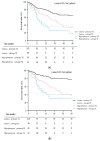Salvage vs. Primary Total Laryngectomy in Patients with Locally Advanced Laryngeal or Hypopharyngeal Carcinoma: Oncologic Outcomes and Their Predictive Factors
- PMID: 36835841
- PMCID: PMC9958790
- DOI: 10.3390/jcm12041305
Salvage vs. Primary Total Laryngectomy in Patients with Locally Advanced Laryngeal or Hypopharyngeal Carcinoma: Oncologic Outcomes and Their Predictive Factors
Abstract
Background: The aims of this study were to compare the survival outcomes of salvage vs. primary total laryngectomy (TL) in patients with locally advanced laryngeal or hypopharyngeal carcinoma and to determine their predictive factors.
Methods: Overall (OS), cause-specific (CSS) and recurrence-free survival (RFS) of primary vs. salvage TL were compared in univariate and multivariate analysis taking into account other potential predictive factors (tumor site, tumor stage, comorbidity level etc.).
Results: A total of 234 patients were included in this study. Five-year OS was 53% and 25% for the primary and salvage TL groups, respectively. Multivariate analysis confirmed the independent negative impact of salvage TL on OS (p = 0.0008), CSS (p < 0.0001) and RFS (p < 0.0001). Hypopharyngeal tumor site, ASA score ≥ 3, N-stage ≥ 2a and positive surgical margins were the main other predictors of oncologic outcomes.
Conclusions: Salvage TL is associated with significantly worse survival rates than primary TL highlighting the need for careful selection of patients who are candidates for larynx preservation. The predictive factors of survival outcomes identified here should be considered in the therapeutic decision-making, especially in the setting of salvage TL, given the poor prognosis of these patients.
Keywords: hypopharyngeal carcinoma; laryngeal carcinoma; larynx preservation; salvage surgery; total laryngectomy.
Conflict of interest statement
The authors declare no conflict of interest.
Figures






Similar articles
-
Treatment outcome in patients undergoing surgery for carcinoma larynx and hypopharynx: a follow-up study.Acta Otolaryngol. 2009 Dec;129(12):1480-5. doi: 10.3109/00016480902748520. Acta Otolaryngol. 2009. PMID: 19922101
-
Induction chemotherapy-based larynx preservation program for locally advanced hypopharyngeal cancer: oncologic and functional outcomes and prognostic factors.Eur Arch Otorhinolaryngol. 2016 Oct;273(10):3299-306. doi: 10.1007/s00405-016-3919-3. Epub 2016 Feb 9. Eur Arch Otorhinolaryngol. 2016. PMID: 26858198
-
Oncologic Outcomes After Salvage Laryngectomy for Squamous Cell Carcinoma of the Larynx and Hypopharynx: A Multicenter Retrospective Cohort Study.Ann Surg Oncol. 2021 Mar;28(3):1751-1761. doi: 10.1245/s10434-020-09017-0. Epub 2020 Aug 28. Ann Surg Oncol. 2021. PMID: 32860174
-
Current Therapeutic Strategies for Patients with Hypopharyngeal Carcinoma: Oncologic and Functional Outcomes.J Clin Med. 2023 Feb 3;12(3):1237. doi: 10.3390/jcm12031237. J Clin Med. 2023. PMID: 36769885 Free PMC article. Review.
-
Survival Outcomes in T3 Laryngeal Cancers: Primary Total Laryngectomy vs. Concurrent Chemoradiation or Radiation Therapy-A Meta-Analysis.Biomedicines. 2023 Jul 28;11(8):2128. doi: 10.3390/biomedicines11082128. Biomedicines. 2023. PMID: 37626625 Free PMC article. Review.
Cited by
-
Closure techniques for esophageal reconstruction after total laryngectomy and their impact on fistula formation.World J Clin Oncol. 2025 Jul 24;16(7):109246. doi: 10.5306/wjco.v16.i7.109246. World J Clin Oncol. 2025. PMID: 40741197 Free PMC article.
-
The Diagnostic Value of CEUS in Assessing Non-Ossified Thyroid Cartilage Invasion in Patients with Laryngeal Squamous Cell Carcinoma.J Clin Med. 2024 Feb 3;13(3):891. doi: 10.3390/jcm13030891. J Clin Med. 2024. PMID: 38337585 Free PMC article.
-
Impact of neck dissection in cN0 patients undergoing primary or salvage total laryngectomy.Eur Arch Otorhinolaryngol. 2024 Dec 7. doi: 10.1007/s00405-024-09126-6. Online ahead of print. Eur Arch Otorhinolaryngol. 2024. PMID: 39643808
-
Time-Intensity Curve Analysis of Contrast-Enhanced Ultrasound for Non-Ossified Thyroid Cartilage Invasion in Laryngeal Squamous Cell Carcinoma.Tomography. 2025 May 16;11(5):57. doi: 10.3390/tomography11050057. Tomography. 2025. PMID: 40423259 Free PMC article.
-
Influential Factors on Survival in Laryngeal Cancer and Treatment Modalities Comparison.ORL J Otorhinolaryngol Relat Spec. 2025;87(1):27-38. doi: 10.1159/000543445. Epub 2025 Jan 14. ORL J Otorhinolaryngol Relat Spec. 2025. PMID: 39809250 Free PMC article.
References
-
- Lefebvre J.-L., Andry G., Chevalier D., Luboinski B., Collette L., Traissac L., de Raucourt D., Langendijk J. Laryngeal preservation with induction chemotherapy for hypophayngeal squamous cell carcinoma: 10-year results of EORTC trial 24891. Ann. Oncol. 2012;23:2708–2714. doi: 10.1093/annonc/mds065. - DOI - PMC - PubMed
LinkOut - more resources
Full Text Sources

